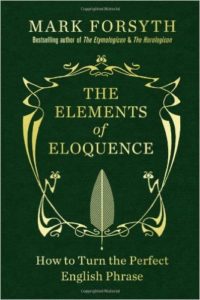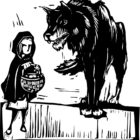 It’s Squib Saturday. Time to share the best, most interesting (or most entertaining, or most outrageous) tidbit of information I’ve gleaned from all the stuff I’ve read –or done– this week: The Language Rules We All Know But Don’t Know We Know
It’s Squib Saturday. Time to share the best, most interesting (or most entertaining, or most outrageous) tidbit of information I’ve gleaned from all the stuff I’ve read –or done– this week: The Language Rules We All Know But Don’t Know We Know
I came across an English language rule (actually two of them) this week that I had never learned in more than 60 years of studying and using the language. The information came to me courtesy of my brother Michael in Prague. He sent me a link to a story that appeared in BBC Magazine last year about a tweet that went viral from BBC Culture editor (@MattAndersonBBC) who copied a paragraph from a book titled The Elements of Eloquence.
Trigger Warning
 A word of caution before I reproduce the paragraph here: this squib might not appeal to writers who have studied Stephen King’s book, On Writing, and have taken to heart his admonition that “every aspiring writer should […] omit needless words.” Nor is it for those writers who hew to the principles laid out in Strunk and White’s Elements of Style : “Write with nouns and verbs, not with adjectives and adverbs.”
A word of caution before I reproduce the paragraph here: this squib might not appeal to writers who have studied Stephen King’s book, On Writing, and have taken to heart his admonition that “every aspiring writer should […] omit needless words.” Nor is it for those writers who hew to the principles laid out in Strunk and White’s Elements of Style : “Write with nouns and verbs, not with adjectives and adverbs.”
This is how the tweeted paragraph from Elements of Eloquence started:
“Adjectives absolutely have to be in this order: opinion-size-age-shape-colour-origin-material-purpose Noun.”
The author had then presented the example of a knife which had all the following properties: it was French, old, green, rectangular, made of silver; it was lovely, little, and used for whittling.
How would you write that description in one phrase? Try it before reading the answer in the next paragraph.
No Green Little Men On Mars
 If you said: A lovely-little-old-rectangular-green-French-silver-whittling knife, you would be correct. The tweet continued: “If you mess with that word order in the slightest you’ll sound like a maniac. It’s an odd thing that every English speaker uses that [order], but almost none of us could write [the rule] out.”
If you said: A lovely-little-old-rectangular-green-French-silver-whittling knife, you would be correct. The tweet continued: “If you mess with that word order in the slightest you’ll sound like a maniac. It’s an odd thing that every English speaker uses that [order], but almost none of us could write [the rule] out.”
Mark Forsyth, the author of The Elements of Eloquence commenting in the BBC magazine article after the tweet went viral explained “English speakers love to learn this sort of thing for two reasons. First, it astonishes us that there are rules that we didn’t know that we knew[…] there’s the shock of realizing that there’s a reason there may be little green men on Mars, but there certainly aren’t green little men.”
“Second,” author Forsyth concluded with true British wit, ” you can spend the next hour of your life trying to think of exceptions, which is useful as it keeps you from doing something foolish like working.”
What about the Big Bad Wolf?
 In fact, you could immediately point out that Big Bad Wolf is an exception with size coming before opinion. As it turns out, you would be right. It is an exception because it falls under another rule that every native English speaker knows, but doesn’t know he/she knows. It’s why you say criss-cross and zig-zag, and not cross-criss or zag-zig. That’s the rule of ablaut reduplication. Yep, I kid you not.
In fact, you could immediately point out that Big Bad Wolf is an exception with size coming before opinion. As it turns out, you would be right. It is an exception because it falls under another rule that every native English speaker knows, but doesn’t know he/she knows. It’s why you say criss-cross and zig-zag, and not cross-criss or zag-zig. That’s the rule of ablaut reduplication. Yep, I kid you not.
I am embarrassed to say I never heard that term before although my son, Dan who is an English major, and who previewed this squib, said he was familiar with it from his linguistics class. (In my defense, I say only that I majored in political science.)
As Forsyth explains: “reduplication is when you repeat a word, sometimes with an altered consonant” like fuddy-duddy or lovey-dovey “or sometimes with an altered vowel” like chit-chat or sing song. In which case the order has to go “I”, “A”, “O” if there are three words, like ding-dang-dong or, if there are only two words then “I” is followed by “A” or “O” as in hip-hop and tic tac. That’s why it is never bad big wolf.
The BBC culture editor who tweeted about this, by the way, got 70,000 “likes” and almost 54,000 retweets.
Okay, got it? Good. Now, you can pour yourself a lovely, big, crystal glass of expensive, vintage, French champagne.
Cheers
“NEVER BAD BIG WOLF”
THE FIRST GRADERS THAT I MENTOR WOULD WITHOUT HESITATION SPEAK AS
WELL AS WRITE “BAD BIG WOLF ” THEY ARE FUGEL WITH THEIR WORDS,AND SPEAK
IN WHISPERS
Hi Don, dear loyal reader. A British writer, Tim Dowling who also commented on this story when it appeared in the UK wrote that rules like the order in which adjectives must be written and spoken, and the exceptions to that rule are “ingrained” in native English speakers.
Dare I suggest that one way rules become “ingrained” is by reading (or being read to as you do with your first graders) and that fairy tales like Little Red Riding Hood (meets the Big Bad Wolf) are classic for “ingraining” those rules. Are first graders these days allowed to read fairy tales like that????
And yes, it is “frugal” but I understood what you meant first time!!!!
And my spelling of fugel should have been FRUGEL. AND PERHAPS IT SHOULD HAVE BEEN FRUGEL
And perhaps FRUGAL? WHAT THE HELL IS THE DIFFERENCE?
That Stuff was always Confusing. Still is. FLASHBACKS TO SAINT RICHARDS ELEMENTARY SCHOOL AND SISTER DAVID. (How did I manage A’s in English Class???)
Hi JC, as I wrote in a comment below, there’s a British writer who described rules like these as being “ingrained” in native English speakers. Sometimes, I wonder if “ingrained” means with a sharp rap of a ruler across the knuckles??? Just kidding!
As an adherent of Spartan brevity, I took a deep breath and plunged ahead. The rule of ablaut reduplication ??
I’m still an adherent. 🙂
Me too. We obviously didn’t need to know all that, anyway. Who would ever need to use seven adjectives for one noun ???